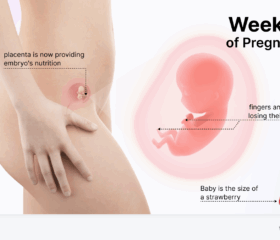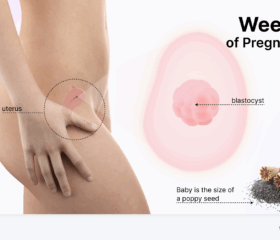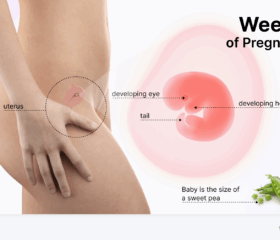Pregnancy Week by Week
26 Weeks Pregnant
Your baby is as big as a zucchini.
14
inches
1.68
pounds
26 Weeks Pregnant: Your Baby, Symptoms, and Tips
As you continue further into your pregnancy, it’s understandable if you’re feeling nervous. Both you and your baby are undergoing big changes, and while your symptoms are hopefully still a lot easier than they were in your first trimester, some new (and unwelcome) ones might be appearing. Let’s dive into what you can expect during this stage of pregnancy.
Your baby's development at 26 weeks
Your baby is now about the size of a zucchini, measuring around 14 inches long and weighing approximately 1.68 pounds. 1 Here’s everything that’s happening to him:
- Eyes opening: Your baby’s eyelids, which have been closed for months to allow his retinas to develop, are opening around this time. While the view from inside the uterus isn’t exactly stimulating, he can now see light and dark. You might even feel a kick in response if you shine a flashlight on your belly! 2
- Developing senses: Your baby’s brain is becoming more active, and he can now respond to sounds, including your voice. You may notice changes in his heartbeat and movement when he hears familiar sounds. He may also even move in response to gentle pokes and prods to your belly. 34
- Lung development: While he isn’t breathing real air yet, your little one is practicing breathing by inhaling and exhaling amniotic fluid. His lungs are also starting to produce a substance called surfactant, which will give his lungs a boost when it’s time for them to expand just after birth. 5
- Testicle descent (for boys): If you’re expecting a boy, his testicles may have already started their descent into the scrotum. 6
When is your baby most active?
Your baby may be more active after you eat, when the levels of sugar in your blood increase. Many women notice that their babies are more active at night, so if your little one has decided that bedtime is party time, know that you’re not alone. 7

Your body at 26 weeks
With your second trimester almost over, your body has changed a lot. This week, you may notice:
- Back pain: If you’re suffering from lower back pain during your pregnancy, you’re not alone—it’s estimated that 50%–70% of expectant women suffer from back pain. 8 With your growing uterus and looser joints and ligaments, it’s no wonder your back is feeling the strain.
- Swelling: It’s normal to end up with swollen feet during your pregnancy, and you might notice some mild swelling in your ankles and fingers, too. This usually isn’t a cause for concern. It’s just caused by your body retaining more fluids than normal. 9
- Braxton Hicks contractions: These “practice” contractions are irregular tightenings of the uterus that can feel like mild cramps. While they can be somewhat uncomfortable, they’re not usually painful, and aren’t a sign of labor.
- Stretch marks: As your belly grows, you might notice stretch marks on your stomach, breasts, and thighs. There’s no way to prevent them, but you’re more likely to get them if you gain more than the average amount (22 lb to 28 lb in total) during pregnancy. 10
Your belly at 26 weeks
At 26 weeks, your belly is continuing to grow steadily. The top of your uterus is now approximately 2.5 inches above your belly button, and your belly will keep growing about half an inch each week. 11
You may be feeling a little unwieldy at this point, especially with your center of gravity shifting, so it’s important to take it slow. Your body—and your baby—are extra-fragile right now, so make sure not to fall.
What are common symptoms at 26 weeks?
Your changing hormones and the increasing pressure from your little one may cause new symptoms to appear, too. Here are some common pregnancy symptoms you might notice at 26 weeks:
- Headaches: You might find yourself suffering from headaches while you’re pregnant, especially if you’re feeling extra stressed and hungry or if you aren’t drinking enough water.
- Constipation: Your increased progesterone levels will slow your digestion down, which can cause you to suffer from constipation during pregnancy. 12
- Clumsiness: As mentioned, your changing center of gravity and loosened joints may make you feel more clumsy than usual. You’ll need to be extra careful on slippery surfaces. 13
- Pregnancy brain: This is another infamous pregnancy symptom, and it isn’t just a myth. You might find yourself more forgetful than usual. Pregnancy brain can start at any point, including in week 26, but don’t worry, it will go back to normal after birth.
- Blurred vision: Your tear production will decrease, leading to dry eyes and blurred vision. 14
- Bloating and gas: Your growing uterus will put pressure on your stomach and intestines, leading to gas and bloating during your pregnancy.
When to see your doctor
Most of the symptoms that you’ll experience at 26 weeks are normal. That being said, you should watch them closely. You may find that a pregnancy tracker app helps you monitor your symptoms more easily (the best pregnancy trackers even let you chart them for easy reference).
In particular, look out for these symptoms during your pregnancy:
- Extremely blurry vision (beyond what could be caused by dry eyes), or any other major changes to your vision
- Severe or persistent headaches
- Sudden or severe swelling on your face, hands, or feet
These symptoms can indicate preeclampsia, a major and potentially life-threatening pregnancy complication, so contact your doctor immediately if you experience any of them. 15
What if you fail your glucose screening?
Before long—usually around the 28-week mark—you’ll have your one-hour glucose screening to check for gestational diabetes. If you fail it, you might have to take a three-hour glucose test. 16 Follow your doctor’s instructions carefully to get an accurate reading.
Since a lot of women don’t experience noticeable gestational diabetes symptoms, these tests are the only way to know for sure whether you have the condition.
If your doctor diagnoses you with gestational diabetes, they’ll be able to help you manage it through exercise and your diet.
How to look after yourself and your baby at 26 weeks
While you’re hopefully finding the second trimester more manageable than the first, your 26th week still probably won’t be perfectly comfortable (pregnancy rarely is). Here are a few tips to manage your symptoms at this stage:
Stay active
While you’ll no doubt need a lot of rest this week, you should also try to stay moderately active. Low-impact cardio, such as walking or swimming, is a good way to keep fit and alleviate symptoms like constipation, back pain, or pregnancy-related insomnia.
Yoga is also a great workout that won’t put too much strain on your body. Just make sure you speak with your doctor before starting any new exercise regime.
Try Kegel exercises
You should try Kegel exercises, which will strengthen your pelvic floor muscles. And give you greater control over them. This can be very helpful during labor. Kegels also help reduce the risk of bladder leakage after delivery.
Find ways to get comfortable
Carrying a little human 24/7 means you’ll have trouble getting comfy. A few little strategies can make a lot of difference:
- Back pain: To combat this, pay attention to your posture and make adjustments if sitting, standing, or sleeping hurts.
- Swelling: Elevate your legs above your heart level, and drink plenty of water. 17
- Other aches and pains: You can try prenatal massage to help with tension and general discomfort, and apply heat or cold to any areas of your body that are achy.
Get enough sleep
With all the extra weight and strain from your growing belly, it may be hard to get a good night’s sleep.
You should start by avoiding the wrong sleeping positions during pregnancy (i.e., lying flat on your back).
Most research suggests that side-sleeping is best when you’re pregnant, and that it can reduce the risk of stillbirth during the third trimester. 18 If you wake up in the night and find yourself sleeping on your back, don’t panic—you can settle back onto your side after.
Many women find sleeping with a pregnancy pillow between their legs helps them sleep more comfortably. If you haven’t already invested in one, now’s a great time to make the purchase.
Stay hydrated
Drink plenty of water throughout the day to help with constipation, headaches, and your overall well-being. You can also drink fruit juices if you don’t particularly like drinking water, but avoid overly sugary drinks.
Eat well
It’s OK to give in to your cravings in moderation, but by and large, make sure you’re eating healthily.
Eat a balanced pregnancy diet that includes plenty of fruits, vegetables, whole grains, and lean protein. Always make sure that all meat, fish, and poultry are cooked (at the proper temperatures) to avoid foodborne illnesses.
If you’re backed up, get a lot of fiber. You can also alleviate constipation with magnesium supplements, although you should talk to your doctor before adding any kind of supplement (beyond your usual prenatal vitamins) to your diet.
Make sure you’re up-to-date with vaccinations
Speak with your doctor if you need any booster vaccinations. You can get the flu shot while pregnant, and it’s also safe to get the COVID-19 vaccines and Tdap shot during your pregnancy. 19
Notably, you and your baby aren’t the only ones you should worry about—it’s also important to make sure any of your loved ones who will be in contact with your baby are vaccinated, too.
How to prepare for your baby
It’s amazing how time flies. You aren’t quite at the finish line yet, but it isn’t nearly as far away as it used to be, and as you approach the third trimester, it’s a good time to start thinking about the final weeks of your pregnancy.
Prepare for your baby’s arrival in these ways:
Plan a babymoon
If you haven’t already, it’s a great idea to plan a relaxing trip, ideally with your partner or someone else, before you’re knee-deep in diapers. Keep in mind that you might need to stay closer to home as you get further along in your pregnancy.
Take classes
In addition to a birth class, consider taking classes on baby care, breastfeeding, and infant CPR. Many hospitals offer these, and there are also online options if you aren’t located near one that does.
Check your gifts
As gifts and hand-me-downs start to come in, check them for updated safety standards. Make sure your crib meets the current guidelines. In particular, avoid drop-side models, as they can be less structurally sound. 20
Start talking to your child
At this point, your baby can hear your voice. Studies suggest that talking to him can help his development, and that your little one prefers your voice over all others. 21
The upshot is that now’s a great time to start talking to your baby, whether that means reading, singing, or simply narrating your day.
Prepare for labor
As you get closer to the big day, start thinking about what kind of birth experience you’d like to have. If you have any specific requirements, such as using a birthing pool or wanting to do a home birth, you’ll need to look into it now.
While you can’t plan everything perfectly and it’s always possible something will throw a wrench in the works, you can have a birth plan in place for many of the possibilities.
Final thoughts
Reaching 26 weeks pregnant is a huge milestone, so put some time aside to celebrate with your loved ones. While the next few months may bring new challenges, they’ll also bring you closer to meeting your baby.
Make the most of your last two weeks of the second trimester and do something you enjoy. As always, listen to your body, and don’t hesitate to speak to your doctor if you have any questions or concerns. You’ve done great so far, so keep up the good work!
Article Sources
- Baby Your Baby. "Fetal Growth Chart" Retrieved June 25, 2025.
- National Health Service. "Week 26" Retrieved June 25, 2025.
- BMC Pediatrics. "The impact of sound stimulations during pregnancy on fetal learning: a systematic review" Retrieved June 25, 2025.
- Infant Behavior and Development. "Fetal behavioral responses to the touch of the mother’s abdomen: A Frame-by-frame analysis" Retrieved June 25, 2025.
- The Birth Company. "Week 25 of Pregnancy (Days 175-181)" Retrieved June 25, 2025.
- Pregnancy, Birth and Baby. "Pregnancy at week 26" Retrieved June 25, 2025.
- Stanford Medicine Children’s Health. "Fetal Movement Counting" Retrieved June 25, 2025.
- Brown University Health. "Back Pain During Pregnancy" Retrieved June 25, 2025.
- National Health Service. "Swollen ankles, feet and fingers in pregnancy" Retrieved June 25, 2025.
- National Health Service. "Stretch marks in pregnancy" Retrieved June 25, 2025.
- American Pregnancy Association. "26 Weeks Pregnant" Retrieved June 25, 2025.
- The Korean Journal of Physiology & Pharmacology. "Estrogen Rather Than Progesterone Cause Constipation in Both Female and Male Mice" Retrieved June 25, 2025.
- University of Utah Health. "Am I Normal: My Pregnancy is Making Me Clumsy" Retrieved June 25, 2025.
- Journal of Family Medicine and Primary Care. "Intraocular pressure and tear production changes in pregnant women at term pregnancy and immediate post-partum: A pilot study" Retrieved June 25, 2025.
- National Health Service. "Pre-eclampsia" Retrieved June 25, 2025.
- OhioHealth. "I Failed my prenatal glucose test. Now what?" Retrieved June 25, 2025.
- The University of Texas Southwestern Medical Center. "5 ways to manage swollen legs and feet during pregnancy" Retrieved June 25, 2025.
- Tommy’s. "Sleep position in pregnancy Q&A" Retrieved June 25, 2025.
- U.S. Centers for Disease Control and Prevention. "About Vaccines and Pregnancy" Retrieved June 25, 2025.
- U.S. Consumer Product Safety Commission. "CPSC Issues Warning on Drop-Side Cribs; 32 Fatalities in Drop-Side Cribs in Last 9 Years" Retrieved June 25, 2025.
- Proceedings of the National Academy of Sciences . "Mother’s voice and heartbeat sounds elicit auditory plasticity in the human brain before full gestation" Retrieved June 25, 2025.







